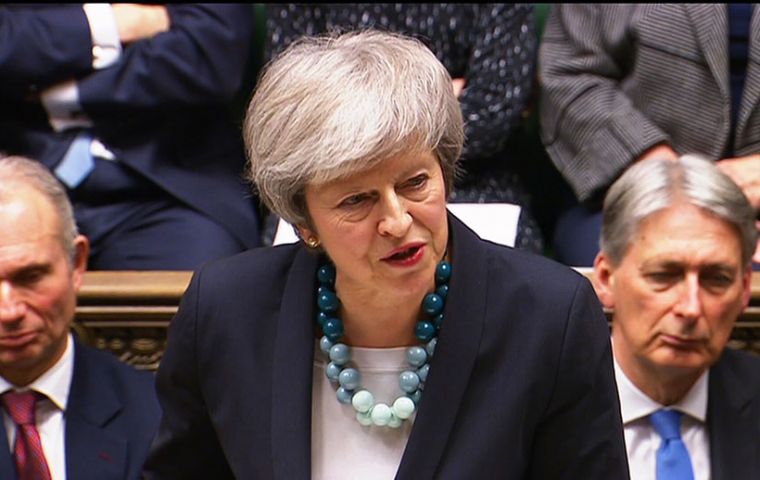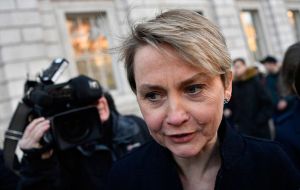MercoPress. South Atlantic News Agency
Theresa May back to Parliament to explain her next moves
 The prime minister will address the Commons on Monday afternoon, setting out how she intends to proceed with the Brexit withdrawal agreement
The prime minister will address the Commons on Monday afternoon, setting out how she intends to proceed with the Brexit withdrawal agreement  Mrs. May will also table a “neutral” motion, simply saying that the Commons has considered her statement, which will be debated and voted upon on 29 January
Mrs. May will also table a “neutral” motion, simply saying that the Commons has considered her statement, which will be debated and voted upon on 29 January  Labour's Yvette Cooper, Conservative Nicky Morgan, and Liberal Democrat MP Norman Lamb - want the UK to extend negotiations with the EU beyond 29 March
Labour's Yvette Cooper, Conservative Nicky Morgan, and Liberal Democrat MP Norman Lamb - want the UK to extend negotiations with the EU beyond 29 March Theresa May will try to convince Tory Brexiteers and DUP MPs to back her withdrawal deal by resolving Irish backstop concerns, Cabinet sources say. Last week, Mrs May said she would focus on cross-party talks to get a Brexit deal accepted by Parliament.
But it is understood she is now seeking to win approval from her own benches, with the government unlikely to win widespread Labour backing. Downing Street insisted that cross-party talks were continuing.
Mrs May held a conference call with her Cabinet on Sunday. It is understood she wants to show the EU that MPs could back a deal without a backstop, in the hope of encouraging Brussels to soften its position.
The backstop is the “insurance policy” in the withdrawal deal, intended to ensure there is no hard border between Northern Ireland and Ireland after the UK leaves the EU.
Mrs May's government agreed a withdrawal deal with the EU in November - covering topics such as the “divorce bill” and the Irish border, but it was rejected by MPs by a majority of 230 votes. If Parliament doesn't approve a withdrawal agreement, the UK is due to leave the EU on 29 March without a deal or transition period.
The prime minister will address the Commons on Monday afternoon, setting out how she intends to proceed with the Brexit withdrawal agreement. She will also table a “neutral” motion, simply saying that the Commons has considered her statement, which will be debated and voted upon on 29 January.
This motion is expected to attract amendments from groups of backbenchers seeking more of a say in the process.
Two groups of MPs are expected to table bills which could take a no-deal Brexit off the table, and potentially suspend Article 50 - which allows the UK to leave the EU. One of the groups, which includes Labor's Yvette Cooper, Conservative Nicky Morgan, and Liberal Democrat MP Norman Lamb - want the UK to extend negotiations with the EU beyond 29 March, if MPs do not approve a withdrawal agreement by 26 February.
Under Mrs May's deal, if there is not a trade deal or other agreement between the UK and the EU when the transition period ends, the backstop kicks in. It would see Northern Ireland staying aligned to some rules of the EU single market.
It would also involve a temporary single custom territory - effectively keeping the whole of the UK in the EU customs union - unless both the EU and UK agree it is no longer necessary. But this has been a huge issue for many Conservative MPs and the DUP, who have supported Theresa May's government since the 2017 election.
Removing or amending the backstop could provide Mrs May with enough backing from Brexiteer Tory MPs and the DUP to get an agreement passed.
Mrs May invited Jeremy Corbyn to cross-party talks on Brexit after she survived a vote of no confidence in her government last week. But the leader of the opposition said he would only enter cross-party talks if the prime minister took the possibility of a no-deal Brexit off the table. Mrs May said that was an “impossible condition”.
Labor's position since Mrs May's withdrawal agreement was rejected by the Commons is to seek a general election - if that fails they would consider backing a second referendum.




Top Comments
Disclaimer & comment rulesCommenting for this story is now closed.
If you have a Facebook account, become a fan and comment on our Facebook Page!